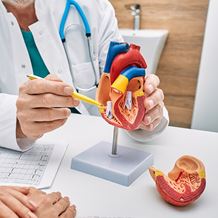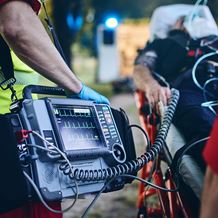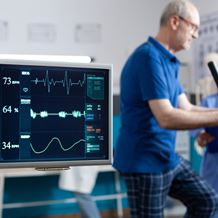
- Home
- Services
- Cardiac Services
- Recovery
- Heart Transplant Surgery Recovery
Heart Transplant Surgery Recovery
Heart transplant surgery is a major procedure that requires a genuine commitment to the recovery process in order to maximise the benefits of surgery. After heart transplant surgery, your new heart will require lifelong protection and care. Taking an active role in your own recovery and following your transplant program is crucial to the success of the operation. Much of it will depend on your health and wellbeing coming into the procedure and this will look different for each patient. Rehabilitation is a vital part of your recovery process, and our specialist cardio rehabilitation team are here to support you at every step as you regain strength and return to daily activities after this lifesaving treatment.
Home preparation for heart transplant surgery
It’s important to stay as heathy as possible before heart transplant surgery. Gentle exercise will boost your energy and keep you feeling positive in the run up to the operation. You are likely to be called into hospital at short notice, and you may stay there for up to three weeks, so it’s important to be prepared in advance as this will help aid your recovery process. Organise some help with daily tasks on your return home, and ensure that you have a recovery space set up where you can rest while your body heals. Upon discharge, your medical team will explain everything you need to know about caring for your new heart, including:
- Your medication requirements
- How to care for your wound after surgery
- What signs and symptoms to look out for
- Your individualised transplant program
- What to expect from your recovery
Your recovery from heart transplant surgery
The first few hours after surgery are critical as your body adjusts to having a new heart. During this time, you will be closely monitored in intensive care before transferring to the recovery ward. Recovery from heart transplant surgery looks different for each patient, but to get the best results from the procedure patients should wholly commit to each element of the recovery process.
- Heart transplant program – All patients are prescribed an individualised heart transplant program that includes medication requirements, physical activity, medical tests and appointments as part of a personalised rehabilitation program
Health monitoring – Patients are encouraged to monitor their own weight and blood pressure, and look for any changes or fluctuations that could indicate a problem
Immunity protection – As your natural immunity levels are now permanently suppressed by anti-rejection medication so that your body does not attack your new heart, it’s important to take extra steps to minimise the risk of infection. Paying particular attention to personal and dental hygiene is now essential
Health checks – Patients are required to attend regular health checks including blood tests, X-rays and heart biopsies
Rehabilitation – Patients are provided with a personalised program to maximise their recovery
Emotional support – Feelings of uncertainty, anxiety, worry and depression are all common in the run up to and aftermath of heart transplant surgery. Our support team are on hand to help you and your family through this time. We provide a multidisciplinary team of psychiatrists, clinical nurses and psychologists to help you adjust and adapt at every step
What to look out for at home
When you return home after your heart transplant surgery, you will take a more active role in your recovery. It’s important to watch out for any signs or symptoms of rejection or infection. Symptoms may include:
- Redness or soreness around the incision site
- Breathlessness or trouble breathing
- Extreme fatigue
- Low blood pressure
- Sudden weight change
Lifestyle changes
Looking after your new heart is essential to making the most of your heart transplant surgery and your doctor may recommend some adjustments to help protect your heart health. These may include:
- Eating a balanced diet including plenty of fresh fruit and vegetables
- Eating lean meats including fish and poultry
- Reducing salt, sugar and fat intake
- Choosing high fibre dietary options
- Maintaining a healthy weight
- Avoiding alcohol for the first three months until advised otherwise
- Regular exercise to strengthen your bones and improve endurance
Average recovery timeline
Week 1
- After surgery, all patients are cared for in hospital until discharged by your treating doctor
- The cardiac rehabilitation program starts in hospital
- Patients are encouraged to walk a little every day to help with the recovery
- All medication should be taken as prescribed
- Patients are discharged home under the care of the transplant team, returning for regular testing and checks
Weeks 2-4
- Heavy lifting and strenuous activities should be avoided until cleared by your treating doctor
- Any activity that strains the chest such as lawn mowing, or golf should be avoided for up to three months
- Avoid using your arms and chest muscles to push yourself up or out of seating
- Talk to your doctor about taking a bath or swimming
- Keep track of your weight and keep your doctor informed of any significant changes
Weeks 4-6
- Continue on with your cardiac rehabilitation exercises
- Strength training can commence once the wound site has healed
- Talk to your doctor about when you are able to safely return to driving
- It is normal to feel a rollercoaster of emotions, keep talking to those around you and always seek support
Week 6 +
- Most patients can return to work after four-six months depending on the activity levels required
- Clinic visits and testing will continue to check your heart health for up to 12 months
- Avoid any type of contact sports as this may damage your chest wound
- International travel is not recommended for the first year
- Patients are advised to stay active and follow all aspects of the heart transplant program as set out by your medical team
Heart Transplant Surgery Recovery FAQs
What's next?
If you have been experiencing heart-related symptoms, book an appointment with our cardiac services specialist today.
Our specialists in Cardiac Services
View all specialists
Related content

Cardiac Services
Cardiology services at St Vincent’s Private Hospitals, advanced cardiac care.
Read More
Heart Failure
A condition that develops when your heart is unable to pump enough blood around your body.
Read More
Recovery
Cardiac recovery and rehabilitation programs are designed to help you after surgery.
Read More

